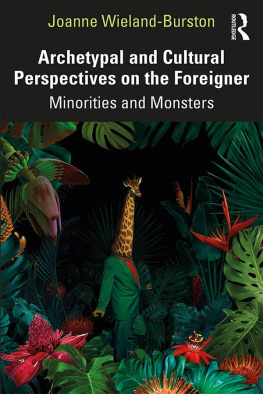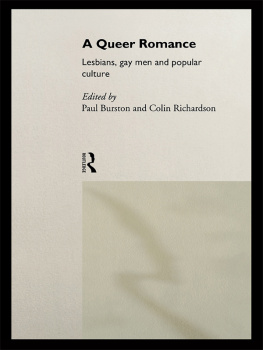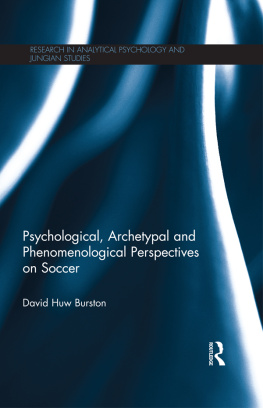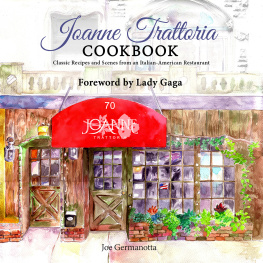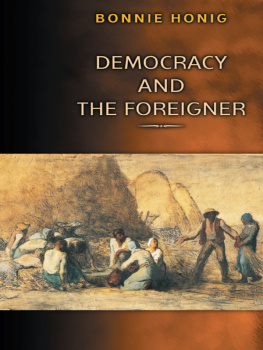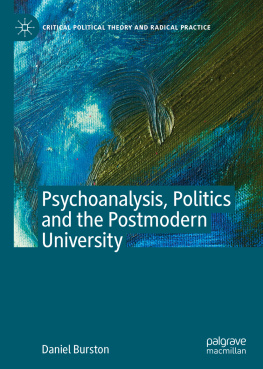Joanne Wieland-Burston - Archetypal and Cultural Perspectives on the Foreigner
Here you can read online Joanne Wieland-Burston - Archetypal and Cultural Perspectives on the Foreigner full text of the book (entire story) in english for free. Download pdf and epub, get meaning, cover and reviews about this ebook. year: 2019, publisher: Taylor and Francis, genre: Religion. Description of the work, (preface) as well as reviews are available. Best literature library LitArk.com created for fans of good reading and offers a wide selection of genres:
Romance novel
Science fiction
Adventure
Detective
Science
History
Home and family
Prose
Art
Politics
Computer
Non-fiction
Religion
Business
Children
Humor
Choose a favorite category and find really read worthwhile books. Enjoy immersion in the world of imagination, feel the emotions of the characters or learn something new for yourself, make an fascinating discovery.
- Book:Archetypal and Cultural Perspectives on the Foreigner
- Author:
- Publisher:Taylor and Francis
- Genre:
- Year:2019
- Rating:4 / 5
- Favourites:Add to favourites
- Your mark:
- 80
- 1
- 2
- 3
- 4
- 5
Archetypal and Cultural Perspectives on the Foreigner: summary, description and annotation
We offer to read an annotation, description, summary or preface (depends on what the author of the book "Archetypal and Cultural Perspectives on the Foreigner" wrote himself). If you haven't found the necessary information about the book — write in the comments, we will try to find it.
Archetypal and Cultural Perspectives on the Foreigner — read online for free the complete book (whole text) full work
Below is the text of the book, divided by pages. System saving the place of the last page read, allows you to conveniently read the book "Archetypal and Cultural Perspectives on the Foreigner" online for free, without having to search again every time where you left off. Put a bookmark, and you can go to the page where you finished reading at any time.
Font size:
Interval:
Bookmark:
In this era of intense migration, the topic of the foreigner is of paramount importance. Joanne Wieland-Burston examines the question of the foreign and foreigner from multiple perspectives and explores how Jung and Freud were more interested in the wide phenomenon of the foreign in the unconscious rather than in their own personal lives. She analyses cultural approaches to the archetype of the foreigner throughout history using literary, cultural (as seen in mythological texts and fairy tales) and psychological references, and interprets the scapegoating of foreign minorities as a projection of the monster onto the foreigner. The book includes contemporary perspectives on immigration and displacement throughout, from analysing patient case material, the archetypal needs of people who join terrorist groups, feelings of alienation, and the work of Palestinian-German psychologist Ahmad Mansour. Throughout this personal and highly topical study, Wieland questions and studies C. G. Jungs own reflections on himself as a foreigner and her own personal experiences.
This book will be vital reading for Jungian psychotherapists and analytical psychologists in practice and in training, as well as for academics and students of Jungian and post-Jungian studies, archetypal studies, identity politics, and courses examining the experiences of displaced persons, refugees, migrants and minority groups.
Joanne Wieland-Burston is an American-born Jungian analyst who studied in Zurich, Switzerland (19771981) and presently practises in Munich, Germany. She is a training analyst, supervisor and instructor at the International School for Analytical Psychology in Zurich and lectures internationally. Her background is in literature and art history.
Joanne Wieland-Burston offers us a book that is quite clear, profound, and excellently documented, on our relationship with the foreigner within us, around us, and afar. It provides observation, investigation, analysis, and personal experience that are of practical use to psychoanalysts and psychotherapists, researchers in the social sciences, and each one of us.
Christian Gaillard, Dr. Psy., training psychoanalyst and supervisor, former President of the International Association for Analytical Psychology, former Professor at the National Academy of Fine Arts, Paris, and author of The Soul of Art: Analysis and Creation, Texas AM University Press
In this impressive and thoughtful book, Joanne Wieland-Burston helps us come to terms with the other in ourselves and in the world around us. This is a most timely and useful book, full of essential insights into the times we live in.
Murray Stein, PhD, author of Jungs Map of the Soul
Joanne Wieland-Burston having been herself involved with migration and alienation explores the theme of the foreigner from manifold angles based on her background as a Jungian analyst and her studies in literature and art history. Her fascinating and differentiated work centers mainly on the modern faces of the foreigner. Giving deep insight in the dominant topic of our culture she deals with the archetypal roots, cultural complexes, scapegoating, alienation of the self and brings all the aspects down to the practical work in psychotherapy. A truly wonderful and inspiring book!
Kathrin Asper, PhD, supervisor, training analyst and lecturer at ISAPZURICH
ARCHETYPAL AND CULTURAL PERSPECTIVES ON THE FOREIGNER
Minorities and Monsters
Joanne Wieland-Burston

First published 2020
by Routledge
2 Park Square, Milton Park, Abingdon, Oxon OX14 4RN
and by Routledge
52 Vanderbilt Avenue, New York, NY 10017
Routledge is an imprint of the Taylor & Francis Group, an informa business
2020 Joanne Wieland-Burston
The right of Joanne Wieland-Burston to be identified as author of this work has been asserted by her in accordance with sections 77 and 78 of the Copyright, Designs and Patents Act 1988.
All rights reserved. No part of this book may be reprinted or reproduced or utilised in any form or by any electronic, mechanical, or other means, now known or hereafter invented, including photocopying and recording, or in any information storage or retrieval system, without permission in writing from the publishers.
Trademark notice: Product or corporate names may be trademarks or registered trademarks, and are used only for identification and explanation without intent to infringe.
British Library Cataloguing-in-Publication Data
A catalogue record for this book is available from the British Library
Library of Congress Cataloging-in-Publication Data
A catalog record has been requested for this book
ISBN: 978-1-138-34580-5 (hbk)
ISBN: 978-1-138-34581-2 (pbk)
ISBN: 978-0-429-43765-6 (ebk)
On preparing this book for publication I came to realise that I have been involved with the topic since early childhood. This has to do with the situation of the family I come from and my own migratory past. I will describe my personal relationship to the topic of the foreigner in the introduction to this book.
As a Jungian analyst in training I had to deal with the multifaceted attitude of C. G. Jung toward foreigners. Some of his remarks (those on Jewish people) I found deeply upsetting; his personal situation as a foreigner I find it easier to empathise with. And I do wonder the extent to which many aspects of Jungs theoretical work were influenced by his own extremely disturbing experiences of feeling like a foreigner. As we shall see in the following pages, the man Carl Gustav Jung plainly shows to the interested researcher many different ways of experiencing and appreciating the foreign.
Throughout my years in clinical practice I have found the topic fascinating on many levels. So many of my clients have had to deal with feelings of alienation, many of them themselves expats or children of immigrants. Some have been, or felt like, outsiders in their own society being nerds, homosexuals, overweight, or just in some way different from the others. I have approached the topic from various angles in many lectures in the past ten years.
In the meantime, innumerable politicians, lawyers, writers, philosophers, psychologists and sociologists have devoted so much time and energy to the phenomenon of the foreign in society that it has become a dominant topic in contemporary culture.
My perspective is that of a Jungian analyst with a background in literature and art history and a deeply concerned foreigner.
For myself the ever repeated encounters with my situation as a foreigner, with my own foreignness within has often been painful, sometimes hardly bearably so. But, coming to accept it as a fact, a matter of fact that is so intimately part of my identity, has made the situation not only easier to bear; it has become a koan for my life.
Encounters with foreigners are what we call archetypal experiences. The Hebrew Bible is full of stories of such encounters, from Avram and Sarais encounter with the strangers who prove to be angels, to Moses experience as a foreigner, to the 40-year-long wanderings of the Hebrew tribes through foreign lands.
At the present time the first quarter of the twenty-first century the topic of the foreigner is so omnipresent that it is extremely difficult to write about it. Most of the questions and excitement revolve around immigrants and their integration in society. These people are refugees from political turmoil, people fleeing poverty and seeking a better future for themselves and their children; they are often of different cultural and religious backgrounds and may have a different skin colour from the local population. It is in this context that the political discourse has become more focused on the topics of racism and anti-Semitism. The literature abounds from articles in the media to erudite essays and even plays and novels.
Font size:
Interval:
Bookmark:
Similar books «Archetypal and Cultural Perspectives on the Foreigner»
Look at similar books to Archetypal and Cultural Perspectives on the Foreigner. We have selected literature similar in name and meaning in the hope of providing readers with more options to find new, interesting, not yet read works.
Discussion, reviews of the book Archetypal and Cultural Perspectives on the Foreigner and just readers' own opinions. Leave your comments, write what you think about the work, its meaning or the main characters. Specify what exactly you liked and what you didn't like, and why you think so.

